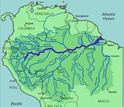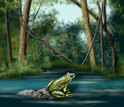News Release 15-128
Opportunities for Promoting Understanding through Synthesis program awards $1.5 million in new grants
Funding will lead to new understanding of subjects as large as the Amazon, as small as a mosquito
_a323082f-fad6-494a-9fdf-f126b0298211_f.jpg)
OPUS awardees address topics ranging from the Amazon ecosystem to mosquitoes and disease.
October 13, 2015
This material is available primarily for archival purposes. Telephone numbers or other contact information may be out of date; please see current contact information at media contacts.
Synthesis: the combination of ideas that forms a theory or system.
For the National Science Foundation's (NSF) Division of Environmental Biology (DEB), synthesis translates into a larger understanding of everything from the ecosystem of the Amazon to lakes large and small to predator-prey relationships to the secret lives of mosquitoes--and the diseases they sometimes carry.
To encourage such syntheses, DEB has established a program called Opportunities for Promoting Understanding through Synthesis (OPUS). This year the program awarded $1.5 million in nine new grants.
Research projects that incorporate synthesis--integrating information from several studies--have been influential in spawning new knowledge, understanding and research directions, scientists have found.
"OPUS awards provide unique opportunities for scientists to reflect on larger themes that emerge over the course of several studies," says George Gilchrist, lead OPUS program director in DEB. "OPUS products are unique synergies that offer insights and tools to inspire new research."
The initiative supports scientists in projects that bring together the body of their research. The awards are given to researchers who have, over time, produced scientific journal papers from a series of related projects but have not yet integrated that series in a single set of conclusions.
OPUS grants are awarded to scientists at mid-to-late career stages, as well as to those early enough in their careers to produce unique insights important to science and to developing future work.
Projects culminate in one or more products such as scientific papers, monographs, software, websites, books, films and artistic interpretations.
Whether about the organisms that live in lakes or what happens to animals in a time of climate change, OPUS awards generate new conclusions that are more than the sum of their parts.
2015 NSF DEB OPUS Awards:
OPUS: Geographical gradients and contemporary end points of organic evolution
William Bradshaw and Christina Holzapfel, University of Oregon
OPUS: Collaborative Research: Analysis of Cross-Boundary Fluxes, Trophic Cascades and Ecosystem Stability Based on 32 Years of Whole-Lake Experiments
Stephen Carpenter, University of Wisconsin-Madison
OPUS: Biogeochemistry of Amazonian Terrestrial Ecosystems
Eric Davidson, University of Maryland Center for Environmental Science
OPUS: Ectotherms in Changing Climates
Marc Mangel, University of California, Santa Cruz
OPUS: Ecological and Evolutionary Perspectives on the Origins of Community Diversity
Gary Mittelbach, Michigan State University
OPUS: Collaborative Research: Analysis of Cross-Boundary Fluxes, Trophic Cascades and Ecosystem Stability Based on 32 Years of Whole-Lake Experiments
Michael Pace, University of Virginia
OPUS: Intrinsic Dynamics of the Regional Community
Robert Ricklefs, University of Missouri-Saint Louis
OPUS: Integrating ecology, behavioral syndromes and social selection
Andrew Sih, University of California, Davis
OPUS: Developing a synthetic understanding of suspension-feeders, master switches in freshwater ecosystems
David Strayer, Cary Institute of Ecosystem Studies
-NSF-
-
Among nine new OPUS subjects this year is the biogeochemistry of the Amazon region.
Credit and Larger Version -
Ectotherms, or organisms without internal heat sources, such as frogs, are a 2015 OPUS topic.
Credit and Larger Version -
The lemon pansy butterfly, found in South Asia's open woods, is another example of an ectotherm.
Credit and Larger Version -
An OPUS tale of two lakes: Paul is smaller; Peter (site of lake experiments) is in the background.
Credit and Larger Version -
An explosion of largemouth bass young accelerated the manipulated lake's changes.
Credit and Larger Version
Media Contacts
Cheryl Dybas, NSF, (703) 292-7734, email: cdybas@nsf.gov
Related Websites
NSF Discovery: Expensive cup o'joe? Blame coffee farm rust fungus: http://nsf.gov/discoveries/disc_summ.jsp?cntn_id=132874&org=NSF
NSF DEB Opportunities for Promoting Understanding through Synthesis (OPUS): http://www.nsf.gov/funding/pgm_summ.jsp?pims_id=13403
http://www.nsf.gov/discoveries/disc_summ.jsp?cntn_id=136524: http://www.nsf.gov/discoveries/disc_summ.jsp?cntn_id=136524
The U.S. National Science Foundation propels the nation forward by advancing fundamental research in all fields of science and engineering. NSF supports research and people by providing facilities, instruments and funding to support their ingenuity and sustain the U.S. as a global leader in research and innovation. With a fiscal year 2023 budget of $9.5 billion, NSF funds reach all 50 states through grants to nearly 2,000 colleges, universities and institutions. Each year, NSF receives more than 40,000 competitive proposals and makes about 11,000 new awards. Those awards include support for cooperative research with industry, Arctic and Antarctic research and operations, and U.S. participation in international scientific efforts.
Connect with us online
NSF website: nsf.gov
NSF News: nsf.gov/news
For News Media: nsf.gov/news/newsroom
Statistics: nsf.gov/statistics/
Awards database: nsf.gov/awardsearch/
Follow us on social
Twitter: twitter.com/NSF
Facebook: facebook.com/US.NSF
Instagram: instagram.com/nsfgov







